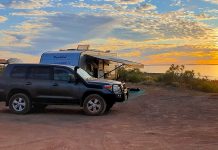Crusader Caravans has come a very long way in a few short years. The Crusaders of this decade are a far cry from the ones of the previous. Many of these advancements can be attributed to the company’s heavy investment in composite fibreglass construction. Further, about a year ago, Crusader Caravans moved into a new, state of the art manufacturing facility to support its impressive growth.
Last month, we reviewed the Crusader Musketeer Camelot, which was essentially an up-specced version of the Musketeer Warrior. However, Crusader had simultaneously launched the Musketeer Centaur, a sub-20ft tandem-axle caravan. This 19ft 6in (internal) all-composite-fibreglass van sports a mid door, front north-south bed, rear ensuite, and a club lounge as standard.
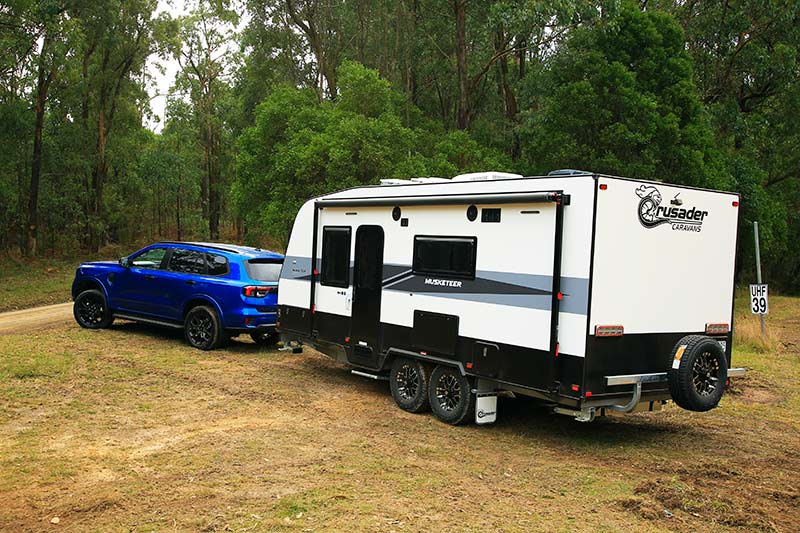 I had the opportunity to hitch this van’s ball coupling to a new Ford Everest and hit the highway, not to mention a few dirt tracks. Let’s climb aboard and take a look around…
I had the opportunity to hitch this van’s ball coupling to a new Ford Everest and hit the highway, not to mention a few dirt tracks. Let’s climb aboard and take a look around…
MEET THE CENTAUR
As with the Camelot, the Centaur is based on an existing Crusader Musketeer. Effectively, this van has all the features of the Musketeer Aramis but in a slightly shorter length, making it a little easier to tow, manoeuvre and store.
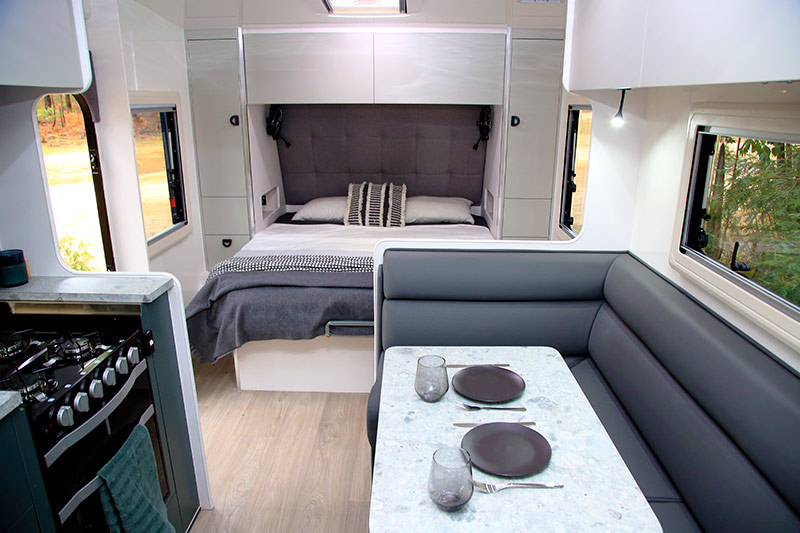 The layout of our particular van felt spacious, despite the inclusion of an offside club lounge. A club lounge is the default dining option; however, you could opt for a cafe or L-shaped setup, or even a couple of recliners. Further, you could swap the position of the dinette and kitchen, so that the kitchen rests amidships on the offside, with the dinette on the nearside. Personally, I’d leave it as is and keep the club lounge. There’s no denying the spaciousness and comfort of this setup.
The layout of our particular van felt spacious, despite the inclusion of an offside club lounge. A club lounge is the default dining option; however, you could opt for a cafe or L-shaped setup, or even a couple of recliners. Further, you could swap the position of the dinette and kitchen, so that the kitchen rests amidships on the offside, with the dinette on the nearside. Personally, I’d leave it as is and keep the club lounge. There’s no denying the spaciousness and comfort of this setup.
The array of lighting options, including remote-controlled LEDs, lets owners set the ambience of their choice. On the subject of aesthetics, Crusader has some new colour schemes available. Our van’s decor was a pleasing combination that’s part of Crusader’s new Designer Series of colours, called Forest Luxe Tea Tree. Our van sported ’Forest Green’ lower cupboards and ‘Lana Grey’ overheads.
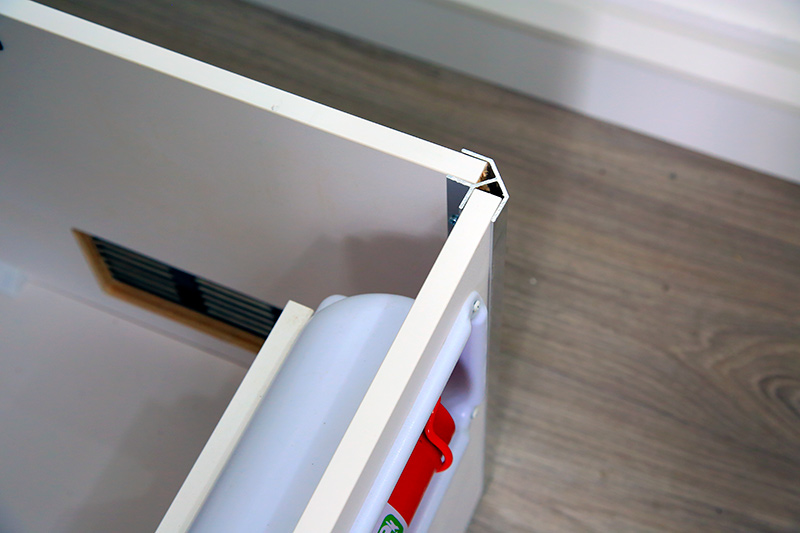 Space around the front bed is unimpeded. The bed itself is surrounded by lockers and wardrobes, each with niches containing 12V and 240V points, while the bedhead is made of padded vinyl. Lifting the bed base revealed a clue as to how this van’s cabinetry locked together: extruded aluminium is used to join the outer frame of the bed base. Nice.
Space around the front bed is unimpeded. The bed itself is surrounded by lockers and wardrobes, each with niches containing 12V and 240V points, while the bedhead is made of padded vinyl. Lifting the bed base revealed a clue as to how this van’s cabinetry locked together: extruded aluminium is used to join the outer frame of the bed base. Nice.
There isn’t as much storage space beneath the mattress as you might be used to, since the housing for the tunnel boot encroaches into this area and some electrical items are stored here. It’s a small design compromise resulting from the fact this van’s external body length is under 20ft.
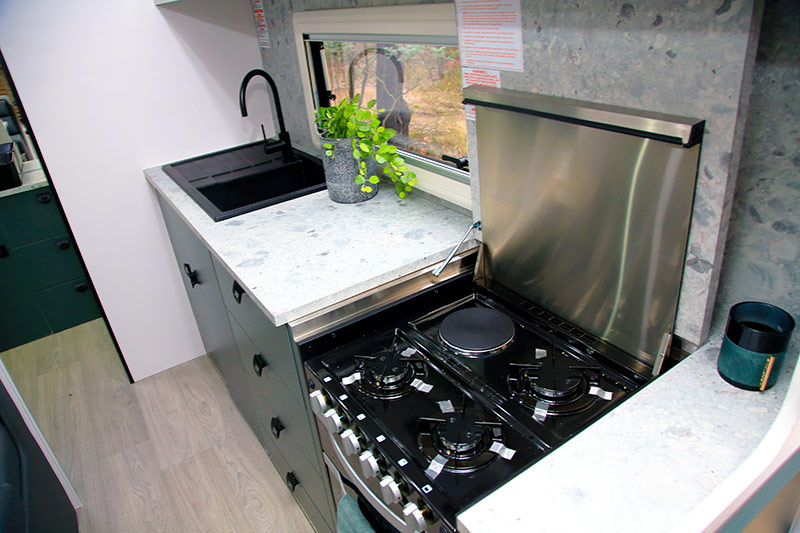 That said, the kitchen does not feel like a compromise at all. Often, when manufacturers attempt to reduce the size of a van, bench space is the first to go. Not so here. There’s plenty of room to work with, and the kitchen gets all the expected features, including a recessed cooktop, griller and oven, a black sink with filtered drinking water, and a decent array of overhead lockers, drawers and cupboards. It was hard to fault the workmanship here.
That said, the kitchen does not feel like a compromise at all. Often, when manufacturers attempt to reduce the size of a van, bench space is the first to go. Not so here. There’s plenty of room to work with, and the kitchen gets all the expected features, including a recessed cooktop, griller and oven, a black sink with filtered drinking water, and a decent array of overhead lockers, drawers and cupboards. It was hard to fault the workmanship here.
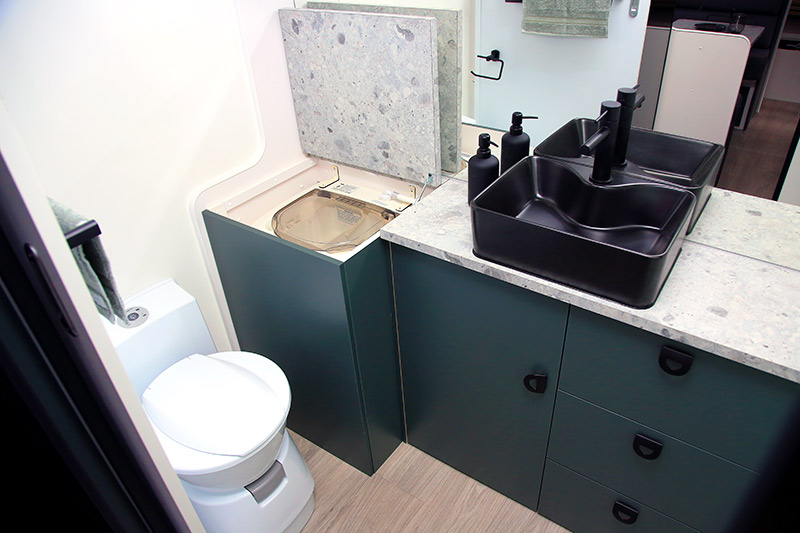 Across the way, between the dinette and bathroom, is a 188L three-way fridge-freezer. The bathroom, meanwhile, features a cassette toilet on the offside and a fully-moulded fibreglass shower cubicle on the nearside. There’s a black sink with matching tapware, a top-loader washing machine hidden under the bench, as well as a large mirror and storage space. A towel rail hasn’t been forgotten either.
Across the way, between the dinette and bathroom, is a 188L three-way fridge-freezer. The bathroom, meanwhile, features a cassette toilet on the offside and a fully-moulded fibreglass shower cubicle on the nearside. There’s a black sink with matching tapware, a top-loader washing machine hidden under the bench, as well as a large mirror and storage space. A towel rail hasn’t been forgotten either.
I have only scratched the surface in terms of the interior of this van. The bottom line: despite packing in the features of the Musketeer Aramis, which had cafe seating and all the other offerings of the Musketeer range, the layout feels spacious and eminently liveable, particularly with the inclusion of a centre door and club lounge.
CRUSADER CARAVANS MUSKETEER CENTAUR CONSTRUCTION
Crusader uses EcoLite composite fibreglass sandwich panels in the construction of all its vans. Crusader engineers use three slightly different, custom-designed EcoLite composite panels in every caravan, each with differing properties. For instance, the floor has a 39mm thickness, providing a robust foundation for the 29mm-thick one-piece composite fibreglass roof and walls.
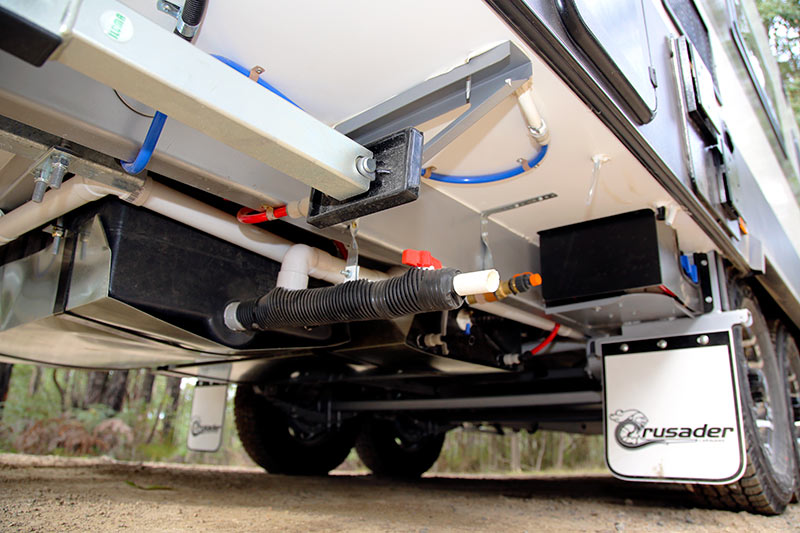 Each one-piece panel locks together in a way that’s unique to Crusader. These panels are undoubtedly strong and comparatively light, while the XPS structural foam core offers excellent thermal efficiency and sound-deadening qualities. Trucks, motorhomes, etc., use similar construction methods.
Each one-piece panel locks together in a way that’s unique to Crusader. These panels are undoubtedly strong and comparatively light, while the XPS structural foam core offers excellent thermal efficiency and sound-deadening qualities. Trucks, motorhomes, etc., use similar construction methods.
A number of external features stood out to me. First, the fact the gas bayonet coupling is mounted into the wall of the van, rather than dangling off the chassis rail, is a winner. You’re paying a lot of money, after all, and this is the kind of finish I would expect.
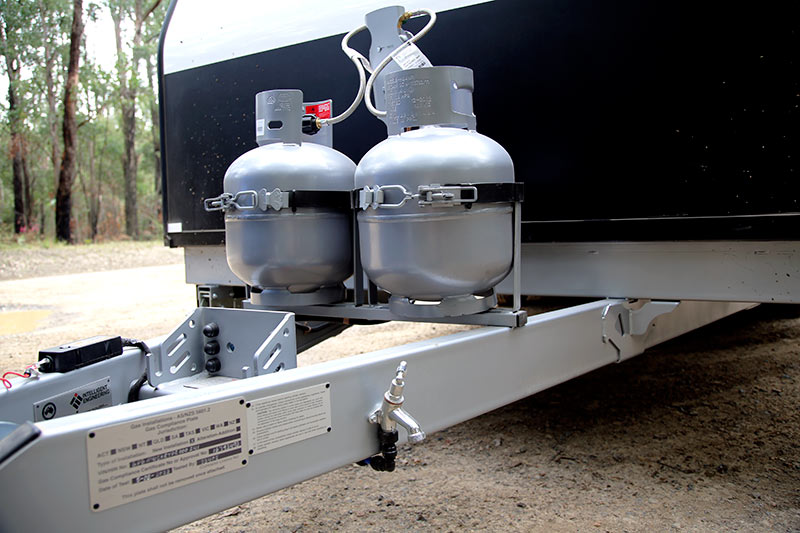 Crusader has also given this van a wireless reversing camera, a couple of 9kg gas cylinders on the A-frame, an A-frame-mounted fresh water tap, a large tunnel boot, entertainment locker allowing you to watch TV under the roll-out awning, a couple of speakers, a picnic table and more. It’s quite a comprehensive fitout, really.
Crusader has also given this van a wireless reversing camera, a couple of 9kg gas cylinders on the A-frame, an A-frame-mounted fresh water tap, a large tunnel boot, entertainment locker allowing you to watch TV under the roll-out awning, a couple of speakers, a picnic table and more. It’s quite a comprehensive fitout, really.
As standard, the Centaur gets beam-axle roller-rocker suspension, two 95L fresh water tanks (mounted fore and aft of the axle set), and a rear-mounted grey water tank. Refreshingly, all the grey water plumbing is wrapped in conduit for protection – a simple, inexpensive solution that other manufacturers should consider too. Inside a sheet-metal box mounted to the offside chassis rail are a couple of taps that allow the user to select which tank to draw water from.
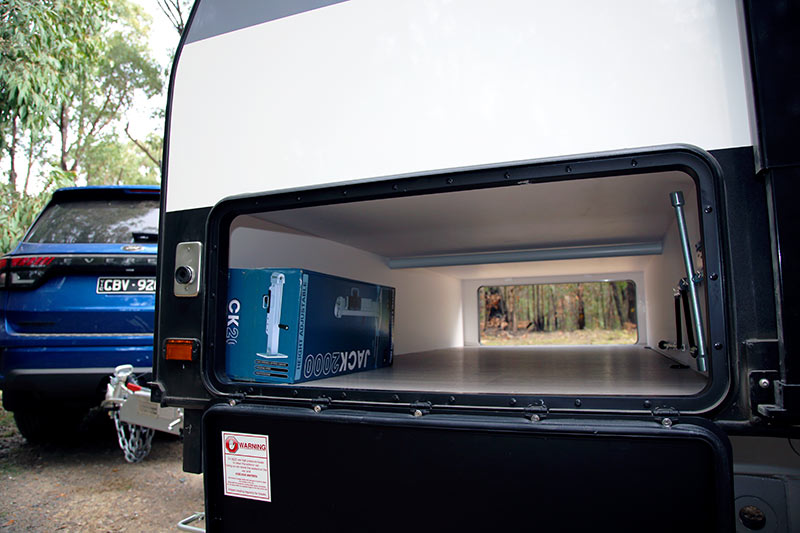 Underneath, the van looks streamlined and ‘clean’, which is to say nothing dangles or protrudes, while the floor itself good and strong, as though it would easily stand up to gravel or the occasional stone flung up from the road.
Underneath, the van looks streamlined and ‘clean’, which is to say nothing dangles or protrudes, while the floor itself good and strong, as though it would easily stand up to gravel or the occasional stone flung up from the road.
In terms of 12V power, the Centaur has a 105Ah deep-cycle battery as standard along with a 170W solar panel. A BMPRO MiniBoost DC-DC charger is also part of the package. And, of course, there’s scope to upgrade at the factory level – Crusader offers a number of bundle packages, including the XCountry All-Terrain package, which is designed to enhance the capabilities of the van for a variety of terrain types.
GORV’S VERDICT
A major benefit of Crusader’s fibreglass sandwich panel construction is weight-reduction. In this case, the van weighed 2198kg Tare. Not bad. It has an ATM of 3200kg, affording it a payload capacity of just over 1000kg.
The 19ft 6in Crusader Musketeer Centaur presents as a worthy addition to the Musketeer range and sports all the hallmarks of a well-built van. It is truly cohesive and comprehensive. Using modern manufacturing methods, with hail-resistant fibreglass, there’s no reason it wouldn’t provide years – or decades – of memories.
THE SCORE!
FIT AND FINISH – 
LAYOUT – 
INNOVATION – 
HITS & MISSES
COMPLETE SPECS
Overall length: 7.45m
External body length: 6.07m
External width: 2.44m
Internal height: 2.03m
Travel height: 2.94m
Tare: 2198kg
GTM: 3003kg
ATM: 3200kg
Unladen ball weight: 197kg
Axle group capacity: 3200kg
Construction: EcoLite fibreglass sandwich panels; one-piece fibreglass composite roof and floor
Coupling: 50mm ball
Chassis: 6in SupaGal
Suspension: Tandem-axle roller-rocker
Brakes: 10in electric drums
Wheels: 15in alloy
Fresh water: 2x95L
Grey water: 1x95L
Awning: Roll-out
Battery: 105Ah deep-cycle with BMPRO Aspero power management system
Solar: 170W
Air-conditioner: Haughton Belaire reverse-cycle
Gas: 2x9kg
Sway control: No
Cooking: Dometic four-burner cooktop with griller and oven
Refrigeration: 188L compressor
Microwave: 23L NCE
Shower: Separate cubicle, fully-moulded fibreglass
Toilet: Cassette
Washing machine: Top-loader
Lighting: 12V LED
Hot water: Gas-electric
Entertainment: 24in flatscreen TV; Bluetooth sound system with speakers inside and out
RRP: $86,390 (ex-Melbourne)
www.crusadercaravans.com.au



